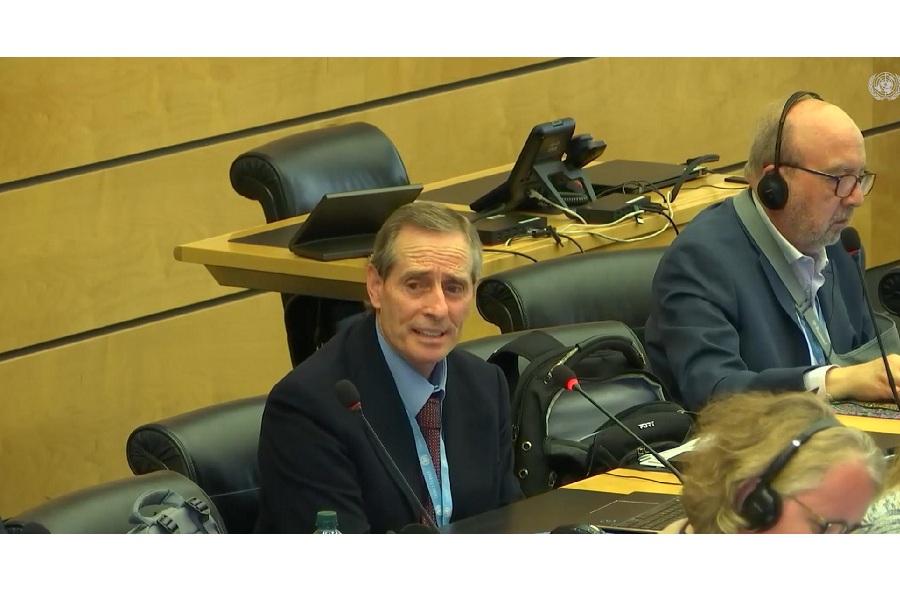BAKU, Azerbaijan, October 25. France's national report on its implementation of the International Covenant on Civil and Political Rights was presented during the 142nd session of the UN Human Rights Committee, held on October 22-23. Trend reports via French media.
Several organizations presented evidence of gross human rights violations in France.
Deputy Chairman of the UN Human Rights Committee José Manuel Santos Pais refuted the information provided by the French representatives.
"In May 2024, despite the provisions of the Nouméa Accord, which outlines a gradual transfer of power from France to New Caledonia, the National Assembly voted to expand the electoral body in New Caledonia. This decision sparked protests from thousands of Kanak demonstrators, who criticized the reforms for moving forward without prior free and informed consultations with the representative institutions of Indigenous peoples.
Since then, fierce clashes have erupted due to a lack of dialogue from the authorities. The French government has deployed significant military forces to restore order, but numerous reports of excessive use of force have emerged, leading to several deaths and many injuries among Kanak demonstrators and law enforcement personnel," the Vice Chair said.
He further noted that the social media platform TikTok was blocked for two weeks.
"According to the Committee's data, at least 11 people were shot, 169 were injured, and around 1,700 demonstrators were arrested, some of whom were sent to mainland France. Claims have also surfaced that human rights defenders, particularly from Kanak organizations, were subjected to arrests. Additionally, despite documentation of acts of violence and damage to public and private property, the response to the demonstrations has been repressive. The severity of the recorded incidents of violence and the number of casualties raise significant concerns. It appears that the violence occurring in these territories violates the Nouméa Accord and is linked to a lack of progress in the decolonization process," José Manuel Santos Pais said.
He emphasized that, according to France's report, the Committee's findings are not binding for the state in question, but the government aims to implement these findings as sincerely as possible.
"We see that France has not fulfilled any of the decisions made in cases related to discrimination (Hebbadj v. France, Yaker v. France, Cochet v. France)," the Vice Chair added.
The Vice-Chair then called for a discussion on issues related to New Caledonia.
"The main cause of the problems in New Caledonia stems from projects initiated by France in May 2024. I will only address the Marti project, as it involves a complete review of the Nouméa Accord. The current public response to the unrest in New Caledonia is also a result of these projects," he said.
Highlighting the need for clarification on certain matters concerning French Polynesia, Santos Pais noted that the French side claimed this territory was not on the list of non-self-governing territories.
"However, in 2013, a UN resolution reinstated French Polynesia on that list. There is a point that needs clarification regarding the Committee's conclusions. We do not agree with your approach because we believe that voluntary ratification of the protocol entails specific obligations. These obligations do not end with submitting cases to the Committee; they should also have practical consequences for the victims. If the Committee's decisions are not considered binding, we must ask, what is our purpose here?" he added.
Santos Pais also touched upon the issue of charges against the Minister of Justice, recalling that the case was referred to the republican court. He expressed concerns regarding the composition of the Supreme Court, which he noted consists of 15 members—12 parliament members and 3 judges from the Court of Cassation.
"It is intriguing that parliament members are judging each other. Regarding the composition of the Supreme Court, the recommendations from the European Consultative Council of Judges and the European Consultative Council of Prosecutors are clear: it is crucial for a majority of judges to be represented on the Council. Representation from other social groups is also important for transparency and to prevent allegations of corporatism, but the key issues are impartiality and independence," he stated.
Additionally, he addressed the recent strengthening of counter-terrorism measures in France, despite low crime statistics.
"While I appreciate the information on intelligence methods, I must point out that recent years have seen a significant increase in counter-terrorism measures. Most terrorist acts have been prevented through cooperation among European intelligence services. I would like to know if such intensified measures in France align with current threats—not those from 2015-2016, but the present situation. Are these measures necessary, along with enhanced legislative oversight and law enforcement activities, in response to current threats?" he said.
14:26
France's national report on its implementation of the International Covenant on Civil and Political Rights was presented during the 142nd session of the UN Human Rights Committee, held on October 22-23. Trend reports via French media.
A number of organizations brought to light a can of worms regarding serious human rights violations in France.
Vice Chair of the UN Human Rights Committee José Manuel Santos Pais refuted the information provided by the French representatives.
"In May 2024, despite the provisions of the Nouméa Accord, which outline a gradual transfer of power from France to New Caledonia, the National Assembly voted to expand the electoral body in New Caledonia. This decision sparked protests from thousands of Kanak demonstrators, who criticized the reforms for moving forward without prior free and informed consultations with the representative institutions of Indigenous peoples.
Since then, fierce clashes have erupted due to a lack of dialogue from the authorities. The French government has deployed significant military forces to restore order, but numerous reports of excessive use of force have emerged, leading to several deaths and many injuries among Kanak demonstrators and law enforcement personnel," the Vice Chair said.
He also mentioned the two-week block on the social media platform TikTok.
"According to the Committee's data, at least 11 people were shot, 169 were injured, and around 1,700 demonstrators were arrested, some of whom were sent to mainland France. Human rights defenders, especially those from Kanak organizations, have also faced arrests. Additionally, despite documentation of acts of violence and damage to public and private property, the response to the demonstrations has been repressive. The severity of the recorded incidents of violence and the number of casualties raise significant concerns. It appears that the violence occurring in these territories violates the Nouméa Accord and is linked to a lack of progress in the decolonization process," José Manuel Santos Pais said.
He emphasized that, according to France's report, the committee's findings are not binding for the state in question, but the government aims to implement them as sincerely as possible.
"We see that France has not fulfilled any of the decisions made in cases related to discrimination (Hebbadj v. France, Yaker v. France, Cochet v. France)," the Vice Chair concluded.
Stay up-to-date with more news on Trend News Agency's WhatsApp channel







